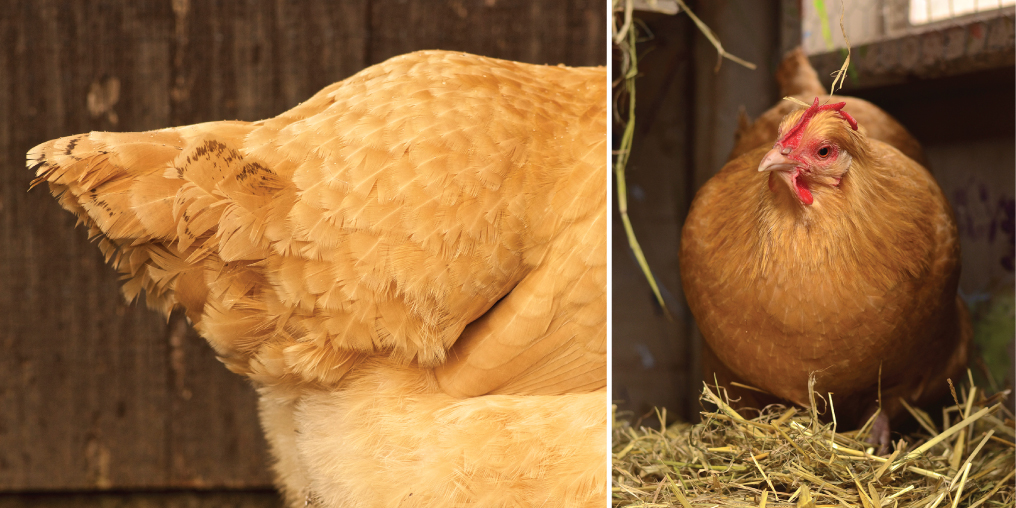While the idea of collecting fresh eggs at home sounds idyllic, don’t think you can wing it. Like most things worth doing, there’s a lot to know about raising chickens, so be a good egg and do your homework. While there’s a considerable amount of work in the initial set up, chickens are a joy to have.
Here are some of the basics:
SPACE
The more room your chickens have to flap their wings and shake their tail feathers, the happier and healthier they’ll be; this activity also alleviates the chance of disease and feather picking. Appropriate space also allows for dust bathing—rolling and flapping around in the dirt. This activity helps them stay clean, and, more importantly, fends off parasites. The size of the breed and how many you have determines the area size that you’ll need for your coop and run.
COOP
While it’s ideal to allow your chickens the freedom to wander your yard if it’s fenced, it is important for them to have a solid coop. This gives them shelter, a sleeping place, nesting boxes for egg laying, and most importantly, protection from predators. Generally speaking you need at least 2 sq ft of coop floor per bird, but larger breeds need up to 5 sq ft.
Chickens can handle cold, but not damp or poorly ventilated lodgings. Better conditions also make it more enjoyable for you when you have to go in and shovel manure, which by the way, makes great fertilizer.
Roosting bars are a must. Chickens instinctively like to sleep off the ground to keep them safe from ground predators. They also do most of their pooping while asleep so it keeps them from sleeping in their own filth.
CHOOSING A BREED
A short list includes Silkies, Showgirls, Rhode Island Reds, Light Sussex, Australorps, Faverolles and even—wait for it—the Easter Egger. When choosing multiple breeds, to add diversity and colour, consider: egg-production and egg-colour, breed temperaments, noise level, cold-hardiness, heat-tolerance, and foraging skill.
SOCIAL PECKERS
Chickens are social birds and, if raised to be, can be social with people, so plan to have three or more. When starting out, get your birds all at once so they’re the same age and grow up together. Chickens take the pecking order seriously! Introducing new birds interrupts this order. If not done slowly and strategically, you’ll have a case of chicken wars and possibly blood on your hands.
FEEDER AND WATER
Chickens feed and drink daily. If you decide to raise them from chicks, to pullets (which are older than a chick but under a year old), to hens, your feed will have to change from a starter/chick feed to a grower feed and then a layer feed. Adding 1 tbsp per gallon of apple cider vinegar to their water supply twice a week promotes overall health.
Chickens are natural foragers, so if you have the means and space, they’ll love the freedom to roam your yard/property to eat bugs, beetles, worms, grass, and all of those nutritious goodies that go into their eggs. The old adage, you are what you eat, is true for your chickens. What they eat goes into those delicious eggs you’re scrambling. Naturally found food, partnered with your veggie and fruit scraps (minus citrus fruit), and a good organic feed or fermented feed (which is better and cheaper in the long run), means you’ll have well-fed “chooks.”
PREDATOR AWARENESS
Eagles, raccoons, snakes, ravens, and even your own Lassie or neighbourhood Garfield can be nasty predators to your chicken family. Knowing your area and what you’re up against is important.
THE CACKLEBERRIES
Chickens aren’t egg-laying machines. They need around 14 hours of daylight to lay. They take their natural rest during the winter and will slow down egg production during the fall. However, don’t be surprised when you’re collecting eggs twice a day during the spring and summer.
Many in the Comox Valley have already discovered the blessings and joy of chicken keeping. Turn to those with years, some with decades, of experience behind them to find out tried-and-true methods. Get their guidance and sound advice. Hatch your plan to start raising your own chickens and you’ll soon have something to crow about.





